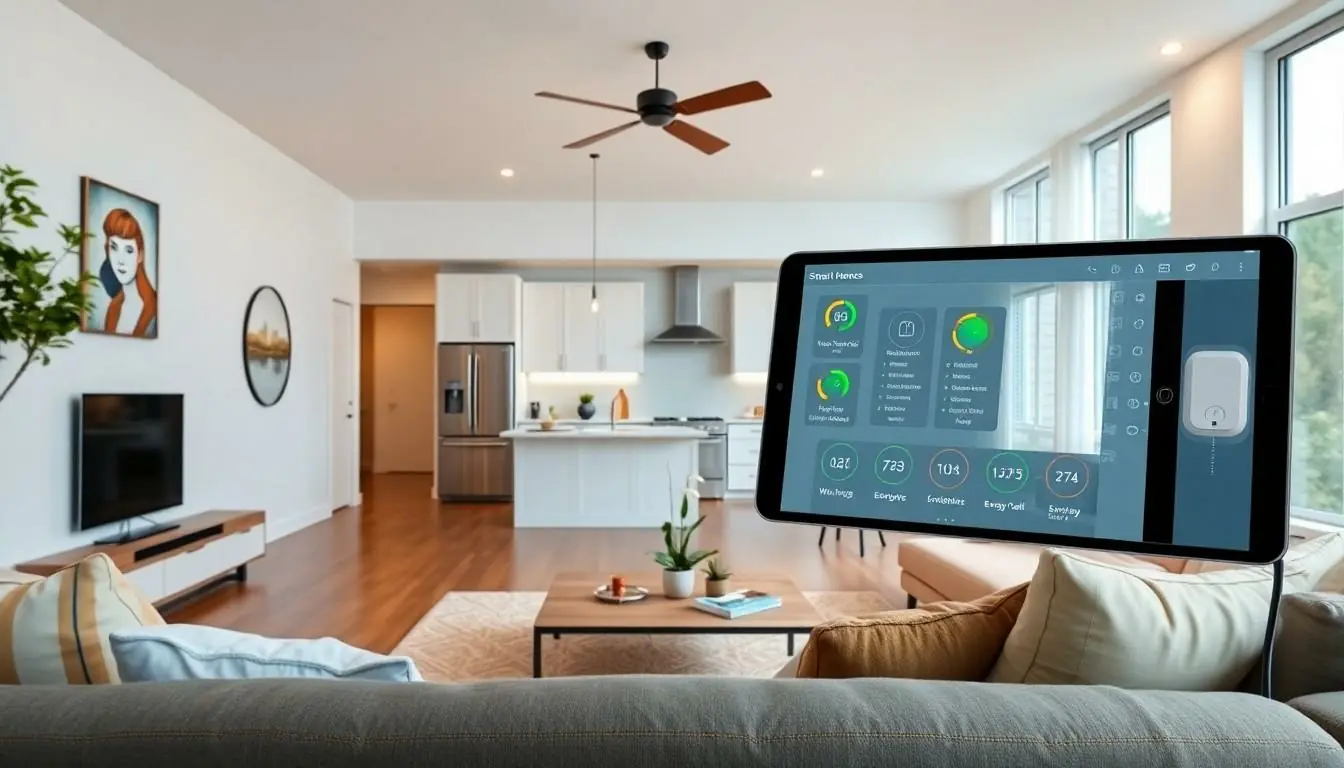Table of Contents
ToggleIn a world where energy bills can feel like a second mortgage, smart home energy management systems are here to rescue wallets and sanity alike. Imagine a home that not only knows when you’re binge-watching your favorite show but also adjusts the thermostat so you don’t melt into the couch. Sounds like sci-fi? Welcome to the future, where your home is smarter than your average pet!
These systems do more than just save energy; they help create a harmonious living environment that’s as efficient as it is comfortable. With the ability to monitor and control energy use from the palm of your hand, homeowners can finally take charge of their energy consumption. Say goodbye to those pesky surprises on your utility bill and hello to a more sustainable lifestyle. Who knew saving the planet could feel this good—and this easy?
Overview Of Smart Home Energy Management Systems
Smart home energy management systems provide users with advanced tools for optimizing energy consumption. These systems integrate with various household devices and appliances, allowing for seamless monitoring and management.
The ability to track real-time energy use enhances decision-making. Homeowners can identify peak usage times and adjust accordingly, leading to noticeable energy savings. Data analytics play a crucial role in this process. Users receive insights into their energy habits, helping them identify areas for improvement.
Automation features offer convenience and enhanced efficiency. For example, smart thermostats can automatically adjust heating and cooling based on occupation patterns. Scheduling features enable users to set energy-efficient routines, further reducing waste.
Control extends beyond the home. Many smart energy management systems provide mobile applications, allowing users to monitor energy usage remotely. Notifications can alert them to unusual consumption patterns, empowering proactive management.
Compatibility with renewable energy sources, such as solar panels, benefits homeowners aiming for sustainability. These systems optimize the use of generated energy, contributing to lower electricity costs.
Incorporating smart home energy management systems fosters a more sustainable lifestyle. Not only do they aid in reducing energy bills, but they also promote eco-friendly practices. The integration of these technologies simplifies energy management, paving the way for a future with enhanced efficiency and reduced environmental impact.
Key Features

Smart home energy management systems come equipped with various features designed to enhance energy efficiency and user experience. These capabilities simplify the task of managing energy consumption while promoting sustainable living.
Real-Time Energy Monitoring
Real-time energy monitoring allows homeowners to track energy usage instantly. By providing insights into how much energy each device consumes, users gain awareness of their consumption patterns. This immediate access to data helps identify peak usage periods and enables users to make informed decisions about their energy habits. Integrating with smart plugs and sensors, these systems highlight opportunities for reducing unnecessary energy drain. Monitoring tools often include historical data, allowing users to compare energy usage over days or months, thereby facilitating informed evaluations of their energy trends.
User-Friendly Interface
User-friendly interfaces streamline the interaction with smart home energy systems. Intuitive designs enable easy navigation through various features, making operation accessible for all household members. Through clear graphics and straightforward instructions, users can quickly access real-time energy stats, historical data, and customized settings. Most systems offer mobile application compatibility, allowing users to manage their energy consumption from anywhere. Notifications about unusual energy activities or reminders to adjust settings enhance overall user engagement, making it simpler to maintain energy efficiency.
Automation and Scheduling
Automation and scheduling tools optimize household energy consumption without user intervention. Users can program devices to turn off or adjust based on certain criteria, such as time of day or occupancy status. Smart thermostats and lighting systems can automatically adjust when no one is home, reducing energy waste. Additionally, scheduling routines for appliances, such as dishwashers and washing machines, allows users to run these devices during off-peak hours for cost savings. Integration with other smart home devices makes the automation process seamless, ultimately fostering an energy-efficient living environment.
Benefits Of Implementing A Smart Home Energy Management System
Smart home energy management systems provide numerous advantages that significantly improve residential energy consumption and efficiency.
Energy Efficiency
Improved energy efficiency represents one of the primary benefits of smart home energy management systems. These systems integrate seamlessly with various household devices, allowing for real-time monitoring of energy use. Users can analyze consumption patterns and identify peak usage times, which leads to more informed decisions about energy consumption. The ability to automate settings based on occupancy ensures devices operate only when needed. Features like smart thermostats adjust heating and cooling automatically, optimizing energy use throughout the day. By reducing unnecessary energy waste, homeowners contribute to a more sustainable environment.
Cost Savings
Cost savings arise as another key advantage of implementing smart home energy management systems. Reduced energy consumption directly translates to lower utility bills. Homeowners often notice significant reductions after identifying inefficient energy practices through data insights provided by these systems. Automation features allow for programming devices to operate during off-peak hours, further lowering costs. Many systems send alerts about unusual energy spikes, enabling quick responses that prevent high charges. Additionally, compatibility with renewable energy sources, such as solar panels, maximizes energy generation, which can further diminish overall costs.
Enhanced User Comfort
Enhanced user comfort plays a vital role in the appeal of smart home energy management systems. These systems allow for the customization of settings based on personal preferences and daily routines. For instance, users can program devices to adjust automatically as they arrive home, creating a comfortable environment without manual input. Moreover, mobile applications provide remote control, allowing adjustments from anywhere. By simplifying energy management tasks, these systems reduce the hassle often associated with traditional energy use. Overall, the convenience and comfort they offer enhance the daily living experience for homeowners.
Popular Smart Home Energy Management Systems
Numerous smart home energy management systems exist, offering a variety of features for optimizing energy use. Each system addresses different needs, providing unique benefits based on user requirements.
System Comparisons
Many systems compete in the market today. Nest, Ecobee, and Honeywell lead the pack, each showcasing distinct tools for energy management. Nest integrates seamlessly with Google Home, allowing for voice control and intuitive learning features. Ecobee offers additional room sensors that optimize heating and cooling based on occupancy patterns. Honeywell boasts a robust mobile app that provides detailed real-time energy analytics. Users benefit from comparing features such as pricing, integration capabilities, and energy-saving potentials.
User Reviews
User feedback highlights varying experiences across different systems. Nest users often praise its user-friendly interface and effective energy-saving capabilities. They mention impressive features that adapt settings based on their living patterns. Ecobee users appreciate its versatility, particularly with smart sensors in multiple rooms. They report significant reductions in energy costs due to enhanced automation. Honeywell reviews emphasize the app’s functionality, enabling easy monitoring and control of energy consumption. Overall, user reviews indicate satisfaction with improved comfort and reduced utility bills across these systems.
Challenges And Considerations
Several challenges arise with smart home energy management systems. It’s essential to understand these hurdles to maximize their benefits.
Initial Setup and Costs
Installation costs play a significant role in the decision-making process. Homeowners may face upfront expenses for purchasing hardware and installation services. Integration with existing devices can complicate initial setup. Some systems require professional installation to ensure optimal performance. Additionally, users need to budget for ongoing costs, including potential subscription fees for advanced features or software updates. Evaluating the long-term savings against these initial investments is crucial for informed decision-making.
Data Privacy and Security
Data privacy raises concerns for users of smart home energy management systems. Personal information often gets collected to analyze energy usage patterns. Users should consider how companies handle this data and what security measures are in place to protect it. Vulnerabilities may exist in connected devices, making them targets for cyberattacks. Regular software updates become essential to safeguard against threats. Users must also review privacy policies to understand data usage and sharing practices clearly.
Smart home energy management systems represent a significant advancement in how homeowners approach energy efficiency and sustainability. By harnessing technology to automate and optimize energy use, these systems not only lower utility bills but also enhance everyday comfort.
As the demand for eco-friendly solutions grows, integrating smart energy management into homes becomes increasingly essential. By choosing the right system and understanding its features, homeowners can take control of their energy consumption while contributing to a greener future.
With the right tools and insights, managing energy use can transform daily living experiences and promote a more sustainable lifestyle.




